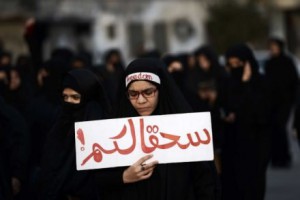Saudi Arabia’s execution of a prominent Shiite cleric and 46 other men prompts outrage in parts of the Middle East.
Saudi Arabia’s execution of a prominent Shiite cleric and 46 other men has prompted outrage in parts of the Middle East.
Forty-seven people, mostly suspected Al Qaeda members but also Sheikh Nimr al-Nimr, were executed after being convicted of adopting the radical “takfiri” ideology, joining “terrorist organisations” and implementing various “criminal plots”.
In neighbouring Iraq, outrage has been seen from protestors threatening the royal family to politicians calling for diplomatic action.
The head of the Shiite Dawa party’s parliamentary bloc urged Baghdad to close the Saudi embassy, expel the ambassador and “execute all Saudi terrorists in Iraqi prisons”.
Khalaf Abdelsamad also warned the execution would have “serious consequences and bring about the end of the Al-Saud [ruling family’s] rule”.
Iraq’s Prime Minister Haider al-Abadi and his predecessor Nouri al-Maliki both belong to the Dawa party.
Mr Abadi expressed “great shock” and warned of the destabilising potential of Nimr’s execution.
“Freedom of speech and peaceful opposition are basic human rights granted by divine and international laws. Violating them impacts the region’s security, stability and social fabric,” he said in a statement.
In the holy Shiite city of Karbala, hundreds demonstrated and urged the closure of the newly opened Saudi embassy.
“No red lines from now on”, “We will reap your souls, Saud and Khalifah”, some of the banners read, referring to the Saudi and Bahraini ruling families.
“I swear to God that the sheikh’s blood was not spilled in vain,” one of the protesters said.
“We will make the Earth shake under your feet,” he added, addressing Saudi’s royal family.
Demonstrations also continued in Iran and in Shiite areas of Saudi Arabia.
Hundreds of protesters marched through Saudi Arabia’s Qatif district in chanting “Down with the Al Saud!”, the name of the ruling Saudi royal family.
The Saudi embassy in Iran was one of several sites where protesters gathered to show their anger over the execution.
In Lebanon, the powerful Shiite movement Hezbollah accused Riyadh of “assassinating” Sheikh Nimr.
It accused Washington of “direct and moral responsibility for this crime” because of its longstanding alliance with Riyadh.
Syrian Information Minister Omran Zohbi described the executions as a crime, saying they were “an assassination of freedoms and human rights”.
He urged international organisations to hold Riyadh accountable, saying “this group assassination is a horrific humanitarian and political crime”.
Rights group Amnesty International said it appeared the kingdom was “using execution to settle political scores”.
Iran warned Riyadh would pay a “high price” for the execution.
Iran’s foreign ministry spokesman Hossein Jaber Ansari strongly condemned Riyadh for executing Nimr despite repeated Iranian requests for clemency.
“The Saudi Government supports terrorist movements and extremists, but confronts domestic critics with oppression and execution … The Saudi Government will pay a high price for following these policies,” he said, quoted by the official IRNA news agency.
“The execution of a figure like Sheikh al-Nimr, who had no means to follow his political and religious goals but through speaking out, merely shows the extent of irresponsibility and imprudence.”
But the United Arab Emirates and Bahrain, members of a Saudi-led coalition battling Iran-backed Shiite rebels in Yemen, have praised the executions.
UAE Foreign Minister Sheikh Abdullah bin Zayed al-Nahyan called them a “clear message against terrorism and those who call for and incite sedition and unrest to tear apart the society’s unity and threaten social peace in the kingdom”.
Bahrain, which has itself faced unrest from its Shiite majority population, also backed Riyadh in “all deterrent and needed measures it takes to confront violence and extremism”.
radioaustralia.net.au



